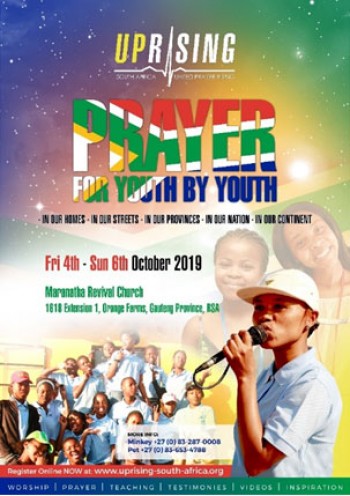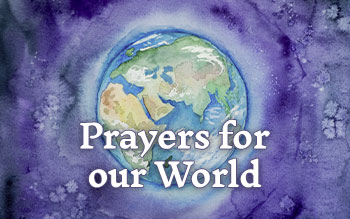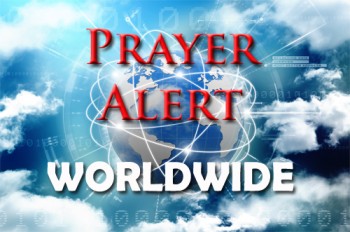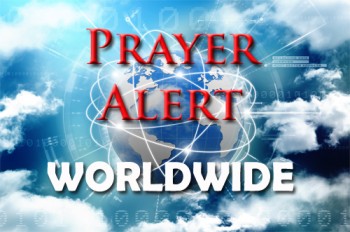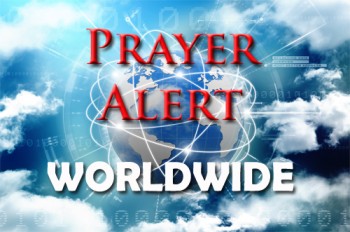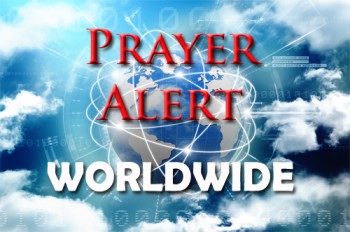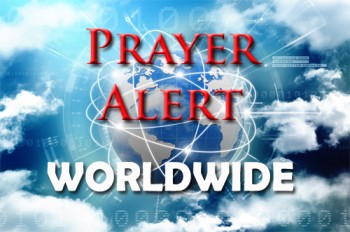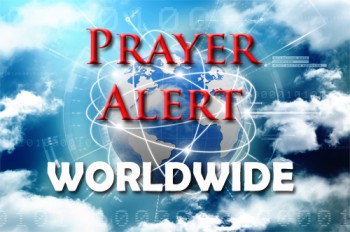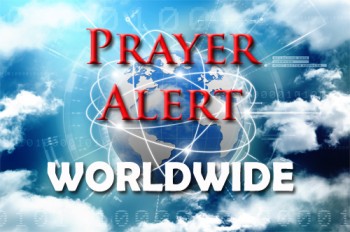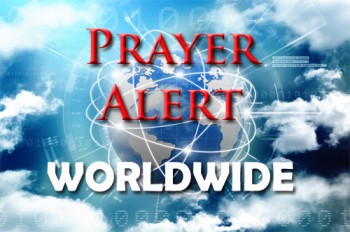Displaying items by tag: Africa
UPRising South Africa – 4-6 October 2019
UPRising South Africa - ‘PRAYER By Youth For Youth’ - 4-6 Oct 2019
The young people of UPRising (United Prayer Rising) are saying that as young people in the church, we are Uniting in Prayer, Rising as a body of young people, forming a revival wave, taking a stand, marching to the gates of Hell to give the devil back his surname and take our Identity back.
And Uniting in prayer together, black or white, every tribe, putting our differences aside and praying non-stop with every young person across South Africa, Africa and around the world. Because where there is United Prayer, (Psalm133:1-3) God is present and where God is, there is hope, love, transformation and honour.
UPRising South Africa aims to mobilise young people in every street, every township, every city, every province to Pray, BELIEVING.... and to see great and wonderful things happen as a result!
We will gather. We will pray. We will see change across our country.
4th - 6th October, Orange Farm, Johannesburg, Gauteng, South Africa.
Bishop Peter Sekhonyane - IPC Leadership Team
More at: www.uprising-south-africa.or
Nigeria: shocking story of martyrdom
ABUJA, NIGERIA – Chuck Holton of CBN visited a refugee camp for people who have been internally displaced from their villages in the north and to the west. 'There are about 2.5 million internally displaced people within Nigeria, and that makes this one of the largest humanitarian crises in the world right now. And the thing that all of these people have in common is that they are Christians,' said Chuck.
Much of Boko Haram's terror is directed at Christians. Enoch Yeohanna was in a village invaded by them. "They started with burning churches, killing the pastors, and killing the members. Shutting them down," he said.
“On 29 September 2014 was the day that they attacked my village. Around ten I had a call that they have killed my dad. They asked him to deny Christ and when he refused they cut off his right hand. Then he refused [again], they cut to the elbow. In which he refused, before they shot him in the forehead, the neck, and chest," Yeohanna went on.
Many of the 1,500 Christians living in this camp have similar stories.
The Nigerian military has mounted large offensives against Boko Haram in recent months, and even with heavy losses on both sides, there seems to be no end in sight. Despite the hardships, these displaced Christians are firm believers in the power of prayer.
"If there is peace, there is nothing that will stop us from going there," Enoch Yeohanna said.
"My faith has helped my prayer life and I believe the prayers of the saints around the world have helped us make it through these tough times,"
Enoch's neighbour, Aisha Walla said -"My hope is that God will bring all those displaced back to their homes so we can worship God together and live in peace."
Pray: for the thousands of families displaced in this disaster, largely Christian – that they will find strength to endure these times of hardship and that they will soon be able to return to their homes safely.
Pray: for those living with the traumas and shocking memories, for healing of their minds and peace.
Pray: that those aligned with Boko Haram will find Jesus, repent and turn from their wicked ways.
Algeria: churches under pressure
Christians in Algeria have requested prayer as a campaign to close churches intensifies. Representatives of l’Église Protestante d’Algérie (EPA), the umbrella group of Protestant churches in Algeria, said most EPA-affiliated churches have been challenged to prove they have licences according to a 2006 ordinance regulating non-Muslim worship. However, the government, ignoring applications from churches, is not issuing licences to them under this ordinance, and several churches have received written orders to cease all activities. By the beginning of September at least seven church buildings had been sealed and services are no longer held there. Recently, after gendarmes attempted to close a church in Ighzer, the congregation occupied it, refusing to leave. However, it has now been sealed. Pray for churches and EPA leaders to know the Lord’s peace, wisdom, and guidance; and for God to turn circumstances around so that closed churches are soon allowed to re-open.
Chad: 30 killed in landslide
Chad’s defence minister has said that a landslide at an illegal gold mine had killed about thirty people in a region near the Libyan border early on 24 September, and more victims might still be buried in the rubble. There has been rapid growth in illegal mining in recent years, often by refugees from Sudan looking for quick money to head to Europe or by rebels fighting the army. Unsafe methods and a lack of oversight mean that accidents are common at such mines across Africa, where impoverished communities seek a share of the vast resources that are usually dug up by international companies, processed and sent overseas. As gold surges, so does illegal mining across Chad, South Africa, Ghana, Zimbabwe and Nigeria - bringing crime, danger and risk to fragile environments.
Burkina Faso: Islam gains as churches close
When the Burkinabe people gained independence in 1960, the motto ‘Unity, progress, justice’ embodied hope for them. Currently almost eighty ethnic groups embrace religious practices: earth priests, fortune tellers, healers, witchcraft, and animal sacrifice. Recently the president of the Episcopal Conference said that over 200 churches have closed in the north of the country to avoid attacks. If the world continues to do nothing, the result will be the elimination of a Christian presence. Muslims and Christians had enjoyed a peaceful coexistence. But this once-peaceful country has turned into a hotbed for extremism, and a long-held peace is under threat. Christians were specifically targeted in recent attacks. The violence has taken hundreds of lives (Muslim and Christian) and displaced tens of thousands more, as Islam rapidly spreads into nearly every ethnic group. Unreached peoples are steadily turning to Islamic teachings.
Nigeria: kidnapped Christians alive?
More than a month after a video which implied that kidnapped Christian teenager Leah Sharibu had been killed, a presidential spokesman, citing intelligence from security agencies, released a statement stating that the government is negotiating with terrorists for the release of Leah and other captives. He said that lines of communication remain open with Boko Haram kidnappers, now called the Islamic State in West Africa Province (ISWAP), to secure their release. The government understands how difficult these times are for the family and friends of the kidnapped girls, and is pursuing many options to ensure their safe return. However, the administration does not encourage payment of ransom to secure the release of captives. For this reason, he said, the government has not rushed to yield to the demands of the terrorist group. However, many no longer believe that the government is genuinely working to free the captives.
Uganda: homeless because of faith
The seventh and youngest child of Lezia Nakayiza, a widow, didn’t know that his family was keeping their Christianity a secret. The 8-year-old boy didn’t realise that telling his Muslim relatives how much he enjoyed a church choir would cause them to attack his family. ‘I could not share my faith with the brothers of my husband as well as the relatives who are radical Muslims’, said Nakayiza. ‘In June my son told one of the relatives of the wonderful choir at church, and that we have been attending the church since March. This was the beginning of our persecution.’ A Christian neighbour told her that the relatives were planning to punish her for leaving Islam, so when she saw many people approaching her house with weapons and shouts of ‘Away with this infidel’, she and her children escaped through the back door. The family is now living at an undisclosed location that is not sustainable.
Burkina Faso: killed for wearing crosses
Burkina Faso is quickly going from a peaceful farming nation to an extremist breeding ground. Attacks by IS and al-Qaeda militants have quadrupled since 2017. Over 70,000 people have fled their homes this year. Recently, gunmen in the north surrounded a group of people and executed four Christians who they found wearing crosses. Previously Christians, Muslims, religious people, and those with no faith lived together peacefully, but now violence is directed specifically at Christians, looking for religious symbols and attacking churches. The militants are really trying to bring division between the Muslims and Christians with a ‘divide and conquer’ mentality. This extremism can be traced back to the fall of Libya, when militants trickled into neighbouring countries like Burkina Faso, bringing their weapons and violence with them. While the rest of the world was focused on surging extremist movements in east and central Africa, the seeds of militant Islam in West Africa were quietly being sown.
Cameroon: Bible translator killed
Bible translator Angus Abraham Fung, working with the Aghem Bible translation project in Cameroon, was among seven people said to have been killed in an overnight attack. His wife’s arm was cut off, according to a ministry source. The attack was carried out by suspected Fulani herdsmen in Cameroon’s violence-ridden Anglophone region where separatists are fighting for independence. Fung, in his sixties, had worked for years on a New Testament translation in the Aghem language. Although it was completed in 2016 and over 3,000 copies have been published, distribution has not happened because of the war in the region. Pray for the swift recovery of his wife and for God’s comfort to all who mourn the death of the seven men. Pray also for the success of all literacy efforts to bring the word of God to people whose language has never been written down before, both in Cameroon and across the nations.
South Africa: agitation and frustration
Cyril Ramaphosa won the May elections on a reformist ticket against ANC’s corrupt old guard. Now he is dealing with a corruption row over land reform in the countryside and xenophobia in the towns. When he took over he pledged to bring ‘ethics’ into politics. But for much of his short tenure, Ramaphosa has fought a campaign addressing financial scandals. His first move as president was spearheading controversial reforms which would advance land transfers to the black majority. But many black people don't yet know how to farm,so they need the white commercial farmers to train and help them. Recently, cities have experienced violent mobs looting shops and torching vehicles owned by foreign nationals, in a wave of xenophobic attacks. Angry residents are calling on the government to deport undocumented migrants. Nigeria sent an envoy to South Africa to express her displeasure over the treatment of her citizens, and Ethiopia's embassy advised its citizens to close their businesses. See also
